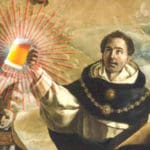Today I sit down with philosopher, Dr. Frey to discuss life. A much more difficult issue than you might think.
Here’s two of the main texts’ from Aquinas that Dr. Frey and I reference … I bet if you read these excerpts after listening to the show they’ll make a lot more sense.
Please support my work (Thank you!) at patreon.com/mattfrad
—
Whether life is properly attributed to God?
I answer that, Life is in the highest degree properly in God. In proof of which it must be considered that since a thing is said to live in so far as it operates of itself and not as moved by another, the more perfectly this power is found in anything, the more perfect is the life of that thing. In things that move and are moved, a threefold order is found. In the first place, the end moves the agent: and the principal agent is that which acts through its form, and sometimes it does so through some instrument that acts by virtue not of its own form, but of the principal agent, and does no more than execute the action. Accordingly there are things that move themselves, not in respect of any form or end naturally inherent in them, but only in respect of the executing of the movement; the form by which they act, and the end of the action being alike determined for them by their nature. Of this kind are plants, which move themselves according to their inherent nature, with regard only to executing the movements of growth and decay.
Other things have self-movement in a higher degree, that is, not only with regard to executing the movement, but even as regards to the form, the principle of movement, which form they acquire of themselves. Of this kind are animals, in which the principle of movement is not a naturally implanted form; but one received through sense. Hence the more perfect is their sense, the more perfect is their power of self-movement. Such as have only the sense of touch, as shellfish, move only with the motion of expansion and contraction; and thus their movement hardly exceeds that of plants. Whereas such as have the sensitive power in perfection, so as to recognize not only connection and touch, but also objects apart from themselves, can move themselves to a distance by progressive movement. Yet although animals of the latter kind receive through sense the form that is the principle of their movement, nevertheless they cannot of themselves propose to themselves the end of their operation, or movement; for this has been implanted in them by nature; and by natural instinct they are moved to any action through the form apprehended by sense. Hence such animals as move themselves in respect to an end they themselves propose are superior to these. This can only be done by reason and intellect; whose province it is to know the proportion between the end and the means to that end, and duly coordinate them. Hence a more perfect degree of life is that of intelligible beings; for their power of self-movement is more perfect. This is shown by the fact that in one and the same man the intellectual faculty moves the sensitive powers; and these by their command move the organs of movement. Thus in the arts we see that the art of using a ship, i.e. the art of navigation, rules the art of ship-designing; and this in its turn rules the art that is only concerned with preparing the material for the ship.
But although our intellect moves itself to some things, yet others are supplied by nature, as are first principles, which it cannot doubt; and the last end, which it cannot but will. Hence, although with respect to some things it moves itself, yet with regard to other things it must be moved by another. Wherefore that being whose act of understanding is its very nature, and which, in what it naturally possesses, is not determined by another, must have life in the most perfect degree. Such is God; and hence in Him principally is life. From this the Philosopher concludes (Metaph. xii, 51), after showing God to be intelligent, that God has life most perfect and eternal, since His intellect is most perfect and always in act.
ST I, Q. 18, A. 3
—
Whether death and other bodily defects are the result of sin?
I answer that, One thing causes another in two ways: first, by reason of itself; secondly, accidentally. By reason of itself, one thing is the cause of another, if it produces its effect by reason of the power of its nature or form, the result being that the effect is directly intended by the cause. Consequently, as death and such like defects are beside the intention of the sinner, it is evident that sin is not, of itself, the cause of these defects. Accidentally, one thing is the cause of another if it causes it by removing an obstacle: thus it is stated in Phys. viii, text. 32, that “by displacing a pillar a man moves accidentally the stone resting thereon.” In this way the sin of our first parent is the cause of death and all such like defects in human nature, in so far as by the sin of our first parent original justice was taken away, whereby not only were the lower powers of the soul held together under the control of reason, without any disorder whatever, but also the whole body was held together in subjection to the soul, without any defect, as stated in the I:97:1. Wherefore, original justice being forfeited through the sin of our first parent; just as human nature was stricken in the soul by the disorder among the powers, as stated above (Article 3; I-II:82:3), so also it became subject to corruption, by reason of disorder in the body.
Now the withdrawal of original justice has the character of punishment, even as the withdrawal of grace has. Consequently, death and all consequent bodily defects are punishments of original sin. And although the defects are not intended by the sinner, nevertheless they are ordered according to the justice of God Who inflicts them as punishments.
Reply to Objection 1. Causes that produce their effects of themselves, if equal, produce equal effects: for if such causes be increased or diminished, the effect is increased or diminished. But equal causes of an obstacle being removed, do not point to equal effects. For supposing a man employs equal force in displacing two columns, it does not follow that the movements of the stones resting on them will be equal; but that one will move with greater velocity, which has the greater weight according to the property of its nature, to which it is left when the obstacle to its falling is removed. Accordingly, when original justice is removed, the nature of the human body is left to itself, so that according to diverse natural temperaments, some men’s bodies are subject to more defects, some to fewer, although original sin is equal in all.
Reply to Objection 2. Both original and actual sin are removed by the same cause that removes these defects, according to the Apostle (Romans 8:11): “He . . . shall quicken . . . your mortal bodies, because of His Spirit that dwelleth in you”: but each is done according to the order of Divine wisdom, at a fitting time. Because it is right that we should first of all be conformed to Christ’s sufferings, before attaining to the immortality and impassibility of glory, which was begun in Him, and by Him acquired for us. Hence it behooves that our bodies should remain, for a time, subject to suffering, in order that we may merit the impassibility of glory, in conformity with Christ.
Reply to Objection 3. Two things may be considered in actual sin, the substance of the act, and the aspect of fault. As regards the substance of the act, actual sin can cause a bodily defect: thus some sicken and die through eating too much. But as regards the fault, it deprives us of grace which is given to us that we may regulate the acts of the soul, but not that we may ward off defects of the body, as original justice did. Wherefore actual sin does not cause those defects, as original sin does.
Article 6. Whether death and other defects are natural to man?
Objection 1. It would seem that death and such like defects are natural to man. For “the corruptible and the incorruptible differ generically” (Metaph. x, text. 26). But man is of the same genus as other animals which are naturally corruptible. Therefore man is naturally corruptible.
Objection 2. Further, whatever is composed of contraries is naturally corruptible, as having within itself the cause of corruption. But such is the human body. Therefore it is naturally corruptible.
Objection 3. Further, a hot thing naturally consumes moisture. Now human life is preserved by hot and moist elements. Since therefore the vital functions are fulfilled by the action of natural heat, as stated in De Anima ii, text. 50, it seems that death and such like defects are natural to man.
On the contrary, (1) God made in man whatever is natural to him. Now “God made not death” (Wisdom 1:13). Therefore death is not natural to man.
(2) Further, that which is natural cannot be called either a punishment or an evil: since what is natural to a thing is suitable to it. But death and such like defects are the punishment of original sin, as stated above (Article 5). Therefore they are not natural to man.
(3) Further, matter is proportionate to form, and everything to its end. Now man’s end is everlasting happiness, as stated above (I-II:2:7; I-II:5:3-4): and the form of the human body is the rational soul, as was proved in the I:75:6. Therefore the human body is naturally incorruptible.
I answer that, We may speak of any corruptible thing in two ways; first, in respect of its universal nature, secondly, as regards its particular nature. A thing’s particular nature is its own power of action and self-preservation. And in respect of this nature, every corruption and defect is contrary to nature, as stated in De Coelo ii, text. 37, since this power tends to the being and preservation of the thing to which it belongs.
On the other hand, the universal nature is an active force in some universal principle of nature, for instance in some heavenly body; or again belonging to some superior substance, in which sense God is said by some to be “the Nature Who makes nature.” This force intends the good and the preservation of the universe, for which alternate generation and corruption in things are requisite: and in this respect corruption and defect in things are natural, not indeed as regards the inclination of the form which is the principle of being and perfection, but as regards the inclination of matter which is allotted proportionately to its particular form according to the discretion of the universal agent. And although every form intends perpetual being as far as it can, yet no form of a corruptible being can achieve its own perpetuity, except the rational soul; for the reason that the latter is not entirely subject to matter, as other forms are; indeed it has an immaterial operation of its own, as stated in the I:75:2. Consequently as regards his form, incorruption is more natural to man than to other corruptible things. But since that very form has a matter composed of contraries, from the inclination of that matter there results corruptibility in the whole. In this respect man is naturally corruptible as regards the nature of his matter left to itself, but not as regards the nature of his form.
The first three objections argue on the side of the matter; while the other three argue on the side of the form. Wherefore in order to solve them, we must observe that the form of man which is the rational soul, in respect of its incorruptibility is adapted to its end, which is everlasting happiness: whereas the human body, which is corruptible, considered in respect of its nature, is, in a way, adapted to its form, and, in another way, it is not. For we may note a twofold condition in any matter, one which the agent chooses, and another which is not chosen by the agent, and is a natural condition of matter. Thus, a smith in order to make a knife, chooses a matter both hard and flexible, which can be sharpened so as to be useful for cutting, and in respect of this condition iron is a matter adapted for a knife: but that iron be breakable and inclined to rust, results from the natural disposition of iron, nor does the workman choose this in the iron, indeed he would do without it if he could: wherefore this disposition of matter is not adapted to the workman’s intention, nor to the purpose of his art. In like manner the human body is the matter chosen by nature in respect of its being of a mixed temperament, in order that it may be most suitable as an organ of touch and of the other sensitive and motive powers. Whereas the fact that it is corruptible is due to a condition of matter, and is not chosen by nature: indeed nature would choose an incorruptible matter if it could. But God, to Whom every nature is subject, in forming man supplied the defect of nature, and by the gift of original justice, gave the body a certain incorruptibility, as was stated in the I:97:1. It is in this sense that it is said that “God made not death,” and that death is the punishment of sin.
– ST I-II, Q. 85, A. 6




Reader Interactions